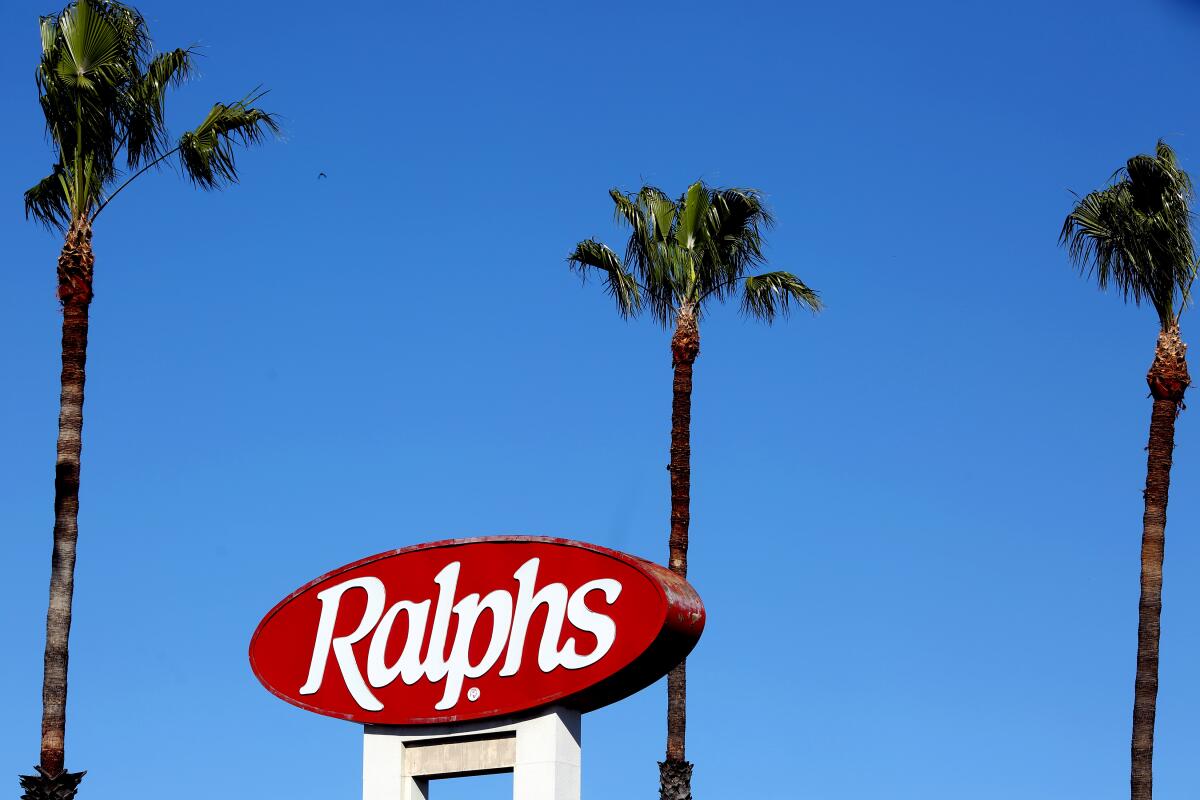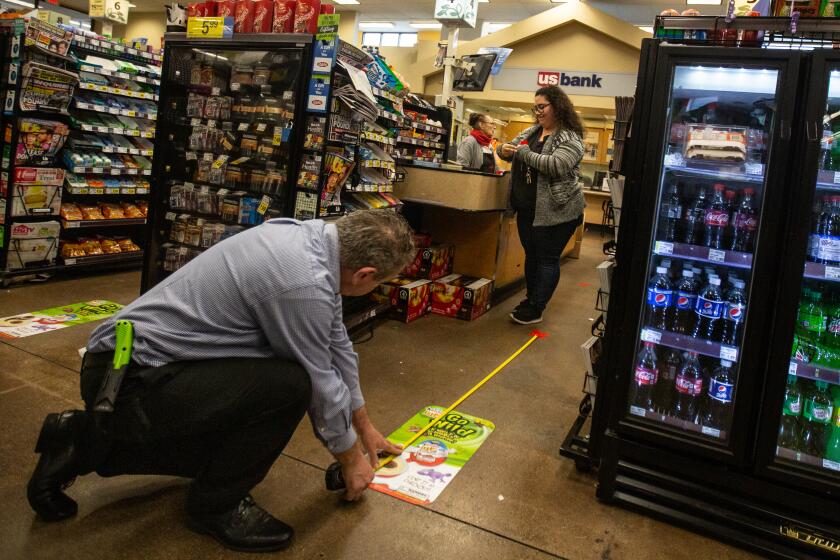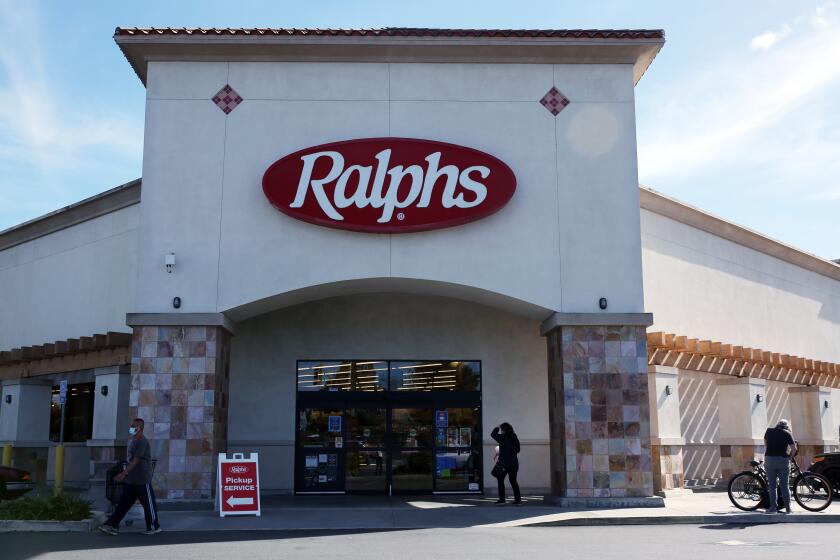Kroger reacts to ‘hero pay’ by closing 2 stores. Here’s how you may be affected

- Share via
The Ralphs supermarket on the corner of Wardlow Road and Los Coyotes Diagonal in Long Beach looks like so many other suburban grocery stores.
But it has become an unlikely flashpoint in the heated battle over whether grocery workers deserve “hero pay” for their work during the pandemic.
Ralphs now plans to close the location after Long Beach approved a hazard wage. And the industry has warned that more stores will close if the such pay rules expand. That has outraged some officials.
Here is a look at the hero pay issue:Q: So what is hero pay?
The concept is that grocery store workers who have put their lives at risk during the pandemic would get extra pay.
Los Angeles became the largest city in the nation to back a proposal requiring grocery stores to temporarily pay workers an extra $5 an hour. The City Council at a meeting Tuesday voted unanimously to draft a pay ordinance, which would then need council approval.
Seattle and Santa Monica have already moved forward with hazard pay. The L.A. County Board of Supervisors is also expected to vote soon on a similar plan.
The L.A. City Council has ordered staff to draft an ordinance requiring big grocery and pharmacy chains to pay workers an extra $5 an hour for 4 months.
On Tuesday, Oakland approved hero pay while San Jose continues to consider the concept.
Local hazard pay ordinances have already sparked some national changes, with Trader Joe’s hiking its “thank you” premium for workers to $4 an hour in response to Seattle’s new rules.
Q: What do supporters say?
The effort has been spearheaded by labor unions but has also won support from politicians in some liberal cities.
United Food and Commercial Workers International, which represents 1.3 million workers in grocery, meatpacking and other front-line industries, is also urging Congress to enact legislation around hazard pay for front-line essential workers and calling on CEOs of major food and retail companies to provide pay boosts.
The cascade of local ordinances around hazard pay in Seattle and several California cities is “just the beginning,” UFCW International President Marc Perrone said in a statement.
Ron Herrera, president of the Los Angeles County Federation of Labor, which represents more than 800,000 workers from more than 300 unions, said the council vote Tuesday was an acknowledgement of the risk facing grocery workers.
Supermarkets and other retail stores that remained open during the pandemic have seen outbreaks of COVID-19. This has put essential workers at risk, and some have spread the virus to family members.
Backers say it’s a small price for supermarket chains to pay.
“They absolutely can afford this increase,” Councilman Paul Koretz said at Tuesday’s meeting. “They absolutely should be paying this increase.”
Backers also expressed outrage at threats to close more stores if ordinances pass, saying it puts shoppers at risk during the pandemic by crowding the remaining stores.
“If they shut down stores, it’s just out of spite. It’s not because they will struggle to survive because they pay their employees a well-deserved $5 an hour extra as hazard pay,” Koretz added.
Q: And the opponents?
Following Long Beach’s mandate to pay its workers an extra $4 an hour, grocery giant Kroger announced it would close a Ralphs and a Food 4 Less location in the city.
“This misguided action by the Long Beach City Council oversteps the traditional bargaining process and applies to some, but not all, grocery workers in the city,” Kroger said in a statement. “The irreparable harm that will come to employees and local citizens as a direct result of the City of Long Beach’s attempt to pick winners and losers, is deeply unfortunate. We are truly saddened that our associates and customers will ultimately be the real victims of the city council’s actions.”
Kroger, the owner of Ralphs, Food 4 Less and other retailers, said that it would close two stores in Long Beach in response to city rules mandating an extra $4 an hour in ‘hero pay’ for grocery workers.
Kroger spokeswoman Vanessa Rosales said in an email the approval of hazard pay mandates for grocery workers in other cities could lead to more store closures. Rosales said she couldn’t share specifics about how additional pay affected profit margins at the two stores but said both were already “underperforming” even before the Long Beach ordinance went into effect Jan. 19.
The Ohio chain said it has spent $1.3 billion to reward workers and to implement safety measures throughout the pandemic.
The California Grocers Assn., which represents about 6,000 stores across the state, filed a lawsuit against Long Beach in federal court.
Neil Saunders, an analyst at GlobalData Retail, said hazard pay ordinances are “quite problematic.”
“It’s very easy to sit in a council chamber and tell someone what you have to pay, because you don’t have to find the money to pay for it,” Saunders said.
Stuart Waldman, president of the Valley Industry and Commerce Assn., said Tuesday’s vote shows the “outsized influence” that labor groups have at City Hall if the council is raising wages during an economic downturn.
Even if the companies are doing well, “the City Council shouldn’t step in and tell the companies that they should be paying their employees more,” Waldman said. “Especially when there’s a negotiated labor agreement in place.”
More to Read
Sign up for Essential California
The most important California stories and recommendations in your inbox every morning.
You may occasionally receive promotional content from the Los Angeles Times.


















